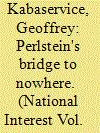|
|
|
Sort Order |
|
|
|
Items / Page
|
|
|
|
|
|
|
| Srl | Item |
| 1 |
ID:
154816


|
|
|
|
|
| Summary/Abstract |
The years following the signature of the Nuclear Non-Proliferation Treaty (NPT) of 1968 have generally been seen as a period of neglect in US non-proliferation policy. While joining recent scholarship questioning this, the article also shows that the policies that emerged from the Nixon–Ford years were the product of a broad range of factors that constrained both the United States’ ability and willingness to build an effective non-proliferation regime. These included the Nixon administration’s initial skepticism regarding the NPT, as well as the global dispersion of power away from the US, combined with the continued importance of anti-Soviet containment.
|
|
|
|
|
|
|
|
|
|
|
|
|
|
|
|
| 2 |
ID:
122593


|
|
|
|
|
| Publication |
2013.
|
| Summary/Abstract |
In 1976 Syria intervened militarily in the Lebanese Civil War in support of the Lebanese Right and against its traditional allies, the Leftist-Palestinian alliance. Scholars have debated what role the United States, and particularly President Gerald Ford and Secretary of State Henry Kissinger, played in Syria's actions. Some scholars argue the U.S. government lured Syria into Lebanon; others argue the Syrian intervention was proposed by Syrian President Hafez al-Asad to the United States. Recently declassified documents support the latter, and demonstrate that the U.S. government initially opposed Syria's proposal for fear that it would trigger a war with Israel. The Ford administration ultimately supported the Syrian occupation of Lebanon, however, because it sought to marginalize the PLO and the militias of Leftist leader Kamal Jumblatt, which challenged America's perceived Cold War interests. This approach accomplished short-term U.S. policy goals, but it did not tend toward solving the region's long-term problems.
|
|
|
|
|
|
|
|
|
|
|
|
|
|
|
|
| 3 |
ID:
133641


|
|
|
|
|
| Publication |
2014.
|
| Summary/Abstract |
A simplistic attempt to explain the rise of the modern American right
ON A SWELTERING Monday in August 1976, delegates began to arrive at the Kemper Arena in Kansas City, Missouri, for the start of the Republican National Convention. Unlike today's tightly scripted party conventions, which have become little more than four-day infomercials, the outcome of this convention was in serious doubt. The presumptive nominee was President Gerald Ford, who had assumed the office only after the resignations of Spiro Agnew and Richard M. Nixon. His challenger was Ronald Reagan, the conservative former governor of California, who could seize the presidential nomination by winning over a comparative handful of uncommitted delegates. It was a moment of high and historic drama. As Rick Perlstein relates, when the delegates arrived at the arena, they were to be greeted by "what was supposed to be a stirring sight": a fifty-foot, 1,500-pound inflated elephant soaring overhead. Unfortunately, in "classic 1970s fashion," the beast's stomach had been accidentally punctured by its rigging and it now wallowed limply in the parking lot.
|
|
|
|
|
|
|
|
|
|
|
|
|
|
|
|
|
|
|
|
|